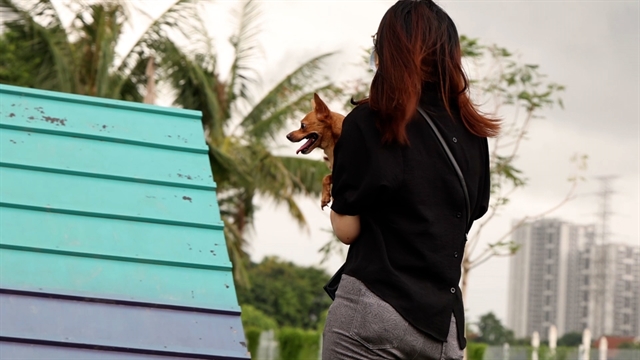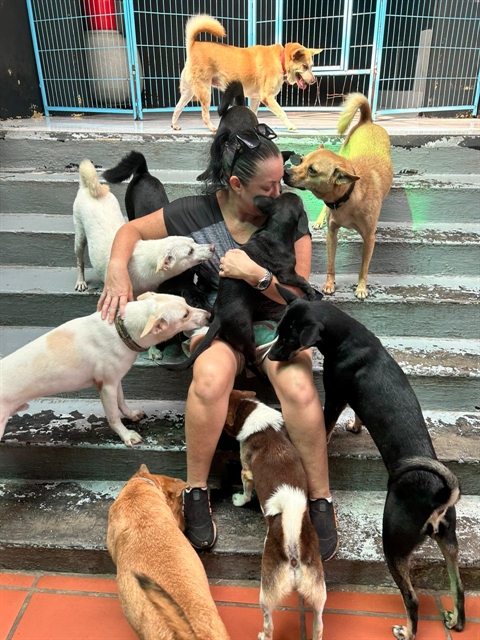 Society
Society

 |
| A woman holds her dog in a dog park in Yên Sở Park of Hà Nội's Hoàng Mai District. VNS Photo |
Vân Nguyễn
Elizabeth Homfray, an animal welfare expert, adopted a Tibetan spaniel that was abandoned near an apartment building in HCM City’s Bình Thạnh District. After discovering the dog was pregnant, she took her to the vet to have ultrasound, only to find out that all the puppies had died.
“That’s probably the reason why she was abandoned,” she said, adding that she was even more “shocked” to discover that breeders had used nylon strings as reusable stitches on the dog.
Her dog Hoa (Flower) is one of many in Việt Nam that share the same fate: used as a tool for breeders to make money and subjected to inhumane treatment at dog farms.
The proliferating breeding industry in Việt Nam, driven by an increasing demand for pets, is trapping many puppies born out of farms with little or no welfare in a vicious cycle of suffering.
Elizabeth said in some facilities, breeders inject dogs with hormones to get them pregnant again as soon as possible. They also take the puppies out early, force feed them formula to make them look fat or ‘healthy’.
Due to the use of hormones for so many years, her dog suffers from thyroid and weight issues.
As breeders prioritise profit, animal welfare is neglected and there is no such thing as an ethical breeding facility model, said Elizabeth, adoption coordinator and founding director of Laws for Paws Vietnam.
Using dogs to make a profit leave them open to abuse as breeders try to do the minimum expense possible by cutting rent, cleaning and vaccination costs, she said.
Normally, breeding dogs never leave the facilities. They do their toilet business inside cages, neither are vaccinated nor have their places cleaned, she said.
“Once those dogs are past breeding, they just literally put them back out onto the street,” she said.
“It's really sad that they've used them for all those years to make money. And that's their fate, they end up on the street,” she said.
Việt Nam News has reached out to a pet distribution company for comment on this issue but has had no response at time of writing this article.
Thẩm Hồng Phượng, Country Director of Humane Society International in Vietnam (HSI in Vietnam) said she is concerned with the dog farming industry in Việt Nam.
“Farming dogs certainly does not meet the requirements of humane dog breeding,” she said.
“There is no regulation in Việt Nam that allows raising dogs in a farm scale.”
Increasing demand, overlooked real truth
In recent years, Việt Nam has seen an uptick demand for pets, particularly specific breeds. This trend is largely driven by the emergence of a middle-income group who desires to have certain breeds to “complete the picture of having arrived at a certain wealth status”, Elizabeth said.
The influence from celebrities also contributes to this trend.
“Local celebrities photographing themselves with small toy breed dogs in Việt Nam pushes demand for these breeds in similar way that western celebrities pushed these breeds in the 90's and early 2000's.”
Animal welfare experts also warn that the trend may heighten the risks of puppies being bred in farms with poor welfare despite good intentions from buyers.
Noting that welfare violations in mills are not unique to Việt Nam but also happen in many parts of the world, Elizabeth said buyers and pet lovers often overlooked this issue.
People often fall for pictures of cute little poodles on Facebook and Instagram without realising the truth behind how these adorable creatures were created at the expense of their mother dogs.
“Breeders and sellers are very tech savvy. They are good at sales and marketing and are all over Facebook with cute pictures of fluffy puppies without showing what is happening, how they get that cute, fluffy puppy,” Elizabeth said.
 |
| Elizabeth and dogs in her shelter. Photo courtesy of Laws for Paws Vietnam |
Concealed dog farms
An ongoing investigation by the Humane Society International also revealed the brutal truth behind the dog farms and their concealed operations in Việt Nam.
“Dogs raised in farm scale can be found in many provinces in Việt Nam with some farms having 200-300 dogs and even 1,000-1,500 dogs,” Phượng told Việt Nam News.
Their ongoing investigation on this issue reveals that puppies are purchased from local households and then transported to their farms, where they are fed and raised for two to three years to reach a weight of 30-40kg before being sold for meat.
“Such farms are not officially allowed by the Government so they operate in secret. They are often located in mountainous or remote areas to avoid complaints about noise and environmental pollution,” she said.
The dogs are mistreated due to the unsanitary environment and lack of space to move around freely in the farms, which are often covered with tarps to conceal their operations, Phượng said.
The expert said she hopes the Government will pay more attention to regulating and managing dog farming for any purpose, whether it is for breeding or meat production.
“Such farms should be subject to strict regulations, and those operating for meat production or breeding purposes should be shut down completely,” she said. VNS




